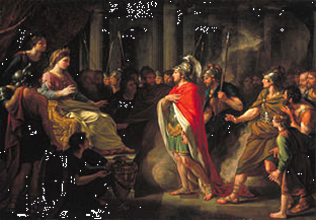Theatre Raleigh‘s newest work, Significant Other, a play by Joshua Harmon, is billed as a comedy, but after sitting through what can only be described as a terribly depressing play, I am at a loss to explain why. To be sure, there are a few comedic passages, but as the all-too-predictable ending nears, the play only redoubles its depressing nature. This show, directed by Julia Murney, has a cast of seven actors who perform ten characters, and these performances are top-notch. Though the performance came off without a hitch opening night, I find I cannot recommend it, unless of course you like your theatre to be absolutely bleak.
All of the characters in Harmon’s play are twenty-five to thirty, with the exception of Jordan’s – the main character’s – grandmother, Helene (Barbara Kingsley). Jordan (Jesse Gephart) is a flawed hero: a Jewish gay man in New York City whose closest friends are all – at the beginning – straight, single women. His best friend, Laura (Emily Bosco), is a mid-twenties teacher who has been dating a much older, married man. As the play opens, Laura and Jordan are at a bachelorette party for their friend, Kiki (Meagan Chieppor), whose nuptials are imminent.
I say Jordan is flawed; in point of fact, all of these characters are flawed. Kiki is terribly self-centered; her friend Vanessa (Shayla LaGrange) is the play’s resident cynic; the most likable character in the play is Laura, but her man troubles have her keeping lots of company with the only man she knows who is not any kind of a threat. She and Jordan were roommates at one time, and theirs seems to be the best relationship in the show. But over the course of two years, as each of Jordan’s three friends get married, Jordan – who is having man troubles of his own – sinks more and more into depression, and it seems that he will not be able to dig himself out of it.
By the end of Act I, Vanessa has also wed, and Laura has found the man she will wed in Act II. Jordan, on the other hand, is obsessed – there’s no other word for it – with a co-worker, Will (Adam Poole, who also plays two of the husbands). Will considers Jordan as little more than a business acquaintance, despite the fact that they do have one sort-of date, a movie that Jordan would not have gone to see on a bet, except of course that Will, a history buff, wants to see it: a documentary on the Franco-Prussian War.
I said they billed this play as a comedy, and in fact, this audience seemed quite amused, though I cannot share in their enthusiasm. The one piece of comedy that I must say was thoroughly well done was the Act II opener, which is a solo scene by Gephart. It is late – after eleven – and Jordan is having a battle with himself over a long, overly-forward e-mail he wrote to Will, but never sent because all three of his friends forbade it. He calls each of them in turn, but gets only voice-mail every time; he is getting more and more put out, both with himself and his missing-in-action buds; and while he debates over his open laptop, he is horrified when he accidentally hits ‘send’ when he has decided he will not do so. Gephart handles this scene extremely well, and it was the prime comic bit of the night.
The play is set in various locales all over NYC, which makes for a very big problem in this very small theater. Kudos to set designer Chris Bernier, who manages to fit all of these sets on this very tiny stage simultaneously. There is Jordan and Will’s workplace, where we also meet Evan (Melvin Gray, Jr.), another co-worker who is also gay. Gray, like Poole, also plays two other roles: Kiki’s husband and an old acquaintance of Jordan’s, who is a possibility, but is too hung up on his own ex to be able to commit to a new relationship with Jordan. We visit Jordan’s apartment, two different bars where two bachelorette parties are held, and Helene’s apartment. Helene, who has seen all her own friends – and her husband – precede her into the cemetery, seems to talk quite a bit about wanting to do herself in, a tendency that depresses Jordan even further.
As I say, this play is a terrible downer, but that may be entirely the point. Contrary to many other contemporary plays with LGBTQ protagonists, in Significant Others, Jordan’s struggle doesn’t seem to be with his sexuality. This is a refreshing change, reflective of our times. As our society progresses towards a more expanded acceptance and understanding of queer culture, despite certain despicable holdouts, it is encouraging to see a play featuring gay characters telling a story relatable to everyone’s inner life: Jordan’s problem is not that he is gay; his problem is that, with every passing minute, he is more and more alone in the world. And that, dear reader, is a universal problem, not just a gay one.
If you go, be advised: there is graphic language and frank discussions on sexual relationships. Significant Other runs through Sunday, June 24. For more details on this production, please view the sidebar.












